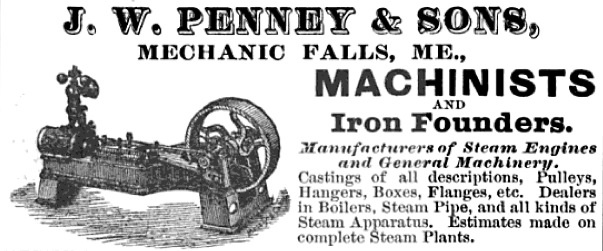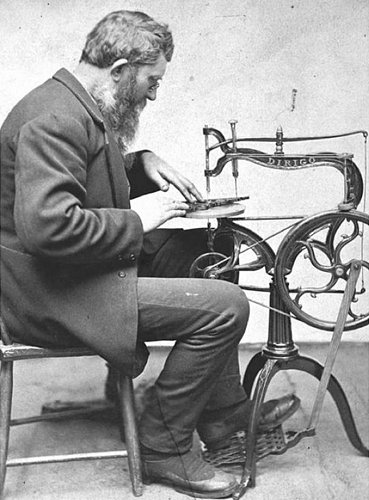Trained as a blacksmith, John Witham Penney was granted a couple of patents related to adjustable wrenches, and, with E. M. Thurston, in 1864-5 manufactured his designs under the name Penney & Thurston. These wrenches are exceedingly rare and so we assume this business venture was unsuccessful.
His wrench-making venture having failed in about 1865, Penney worked for the local Denison Paper Co., but left in 1872 to manufacture steam engines and other types of machinery under the name J. W. Penney, and, in at least 1873, J. W. Penney & Son. In 1886 his two sons became partners, and the name changed to J. W. Penney & Sons Co. J. W. Penney retired from the business in 1892 but the family-run company survived into the 1980s.

Ad from 1888 "Maine Register"
In their early years this firm made an early, aesthetically pleasing treadle scrollsaw called the Dirigo. The Canadian firm of W. N. Sears made an identical Dirigo brand saw.

Mr. J. W. Penney and his patented Dirigo saw, ca. 1877, taken from "Made in Maine" by Paul E. Rivard. See the "Images" tab for a larger version of the photograph.
Information Sources
- The wrench-collecting community has put together what little information we have on Penney & Thurston. See, for example, the datamp.org page on patent 44,653, an 1864 wrench patent granted to John W. Penney of Mechanic Falls. See also the Penney & Thurston page at the Davistown Museum site.
- An 1873 report on the industries of Maine, compiled by the Maine Department of Industrial Statistics, lists "J. W. Penney & Son, production, machinery, steam pumps and engines."
- In an 1877 article in Manufacturer & Builder article it was simply "J. W. Penney."
- Public Documents of Maine: being the Annual Report of the various Public Officers and Institutions for the Year 1877 lists in its "town statistics", under the town of Minot, "J. W. Penney, machinist".
- The 1888 Maine Register lists "J. W. Penney & Sons, machinists and iron founders". An ad from that publication appears on this page.
- The January 1897 issue of The Foundry has this news item:
J. W. Penney & Sons, Mechanics Falls, Me., have made an extensive addition to their shop. They make a specialty of bronze work.
- The April 1902 edition of Iron Moulders' Journal bore the following notice:
Br. Walter S. McCrater, Financial Secretary No. 64, Math, Me., has accepted the foremanship of J. W. Penney & Sons' foundry, Mechanic Falls. The best wishes of his fellow members go with him.
- A Penney family remember forwarded us the following information from the Auburn Historical Society:
John Witham Penney was born in New Gloucester in 1831, and his education was received in the common schools. He came to Mechanic Falls in 1860 where he worked at his trade as a blacksmith. Five years later he sold his shop and tools to the Denison Paper company and entered the service of that corporation where he remained until 1872.
In 1872 J. W. Penney established his own company and began manufacturing steam engines, machinery and foundry articles of all kinds. In 1886 he admitted his two sons, A. R. and S. R. Penney to partnership and from that time their business known as J. W. Penney &x Sons company grew to become one of the greatest machine shops in Maine and was a great factor in the prosperity of Mechanic Falls.
J. W. Penney retired from business in 1892 and devoted himself to his favorite occupation of writing and collecting Indian relics. Of these he had a fine collection which he presented to the Maine Historical Society. A smaller portion of his collection was later given to the Androscoggin Historical Society and are on display there. Some 124 potsherds, listed as the "J. W. Penney Collection," are found at our museum and were catalogued in December of 1983 by the Maine Historic Preservation Society. A copy of that work can be found at our Society. The catalogue mentions that Penney had gathered his Indian relics from Indian village sites along Bog Brook in Minot and on Laurel Hill in Auburn.
- Ad in the 1955-56 edition of Hitchcock's Wood Workers Digest Directory for their "short log saw."
- American Steam Engine Builders: 1800-1900 by Kenneth L. Cope, 2006 page 184